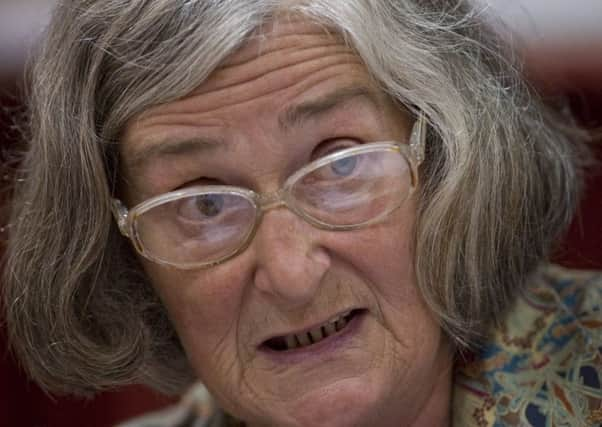Obituary: Helen Steven, peace activist


Tere’s a great story told about Helen Steven, the renowned Scottish pacifist who has died aged 73.
It concerns the pugnacious American academic RD Laing who, whilst on the island of Iona and characteristically drunk, had stumbled roaring into a church service at the Cathedral and caused no small amount of mahem. Evidently nobody could control him, except Helen. She was charming, but intellectually very sharp and using all of these skills she calmed RD’S troubled spirit, made him tea and toast and then spent half the night with him in the Church as he played classical music on the grand piano!
It is a tale that rather defines this remarkable women.
Advertisement
Hide AdAdvertisement
Hide AdHelen could rightly be termed one of the leading Scottish pacifists of her era and was celebrated as such not only by her fellow campaigners in places like Greenham Common but also by generals and leaders of Nato who would invite her to lecture to them and indeed attend her own conferences on Iona confident that the arguments would be intelligently made and their own opinions listened to with objectivity.
She was born near Glasgow in 1942 to a middle class family and a father, Campbell, who was both a writer and a keen mountaineer and quickly learned to love both those skills, concentrating her interests on history and applied Christianity when she was being educated at the prestigious Laurel Bank private school. Bizarrely her primary interest in history at that time was of armies and battles but she had a great love of learning and after the University at Glasgow went back to teach history for seven years at the famously prime and proper Laurel Bank. In 1970 s he led the first woman’s climbing expedition to Greenland.
It was Vietnam that changed the respectable Laurel Bank history teacher into one of the most influential and some might argue politically effective, Scottish pacifist radicals of her generation.
In 1972 , aged 30, she had gone with a Christian group to work in orphanages there and was appalled to discover the extent of the suffering of the entirely innocent in that war.
Never one to dodge the obligation to physically act rather than just talk about problems, she quickly teamed up with a fellow pacifist who was to go on to become both her beloved life-long partner and intellectual foil, Ellen Moxley. The two were later to return to Britain with a young Vietnamese orphan, Marian, now in her 40s and happily married.
From then on the action came thick and fast. Much of it was organised through the Iona Community, an ecumenical organisation committed to finding new ways to peace whose spiritual base was on Iona.
Although not an entirely pacifist group, it’s founder and leader George Macleod most certainly was (Heaven help me I should know, he was my father), and he shared both Helen’s passion and her insistence that mere intellectual commitment wasn’t enough for anyone who chose to follow Christ. The two became firm friends and as the Rev Peter Macdonald has recently observed: “When George became too old she effectively took over his torch as the leader of the pacifist side of the community.”
George truly admired her indeed only a few days after his own wife died of a sudden heart attack, he travelled across Scotland to support her in a court case. He was nearly 90 at the time.
Advertisement
Hide AdAdvertisement
Hide AdIn 1979, recognising her unique ability to discuss peace issues with people from all backgrounds, the Iona Community appointed Helen as their first and only peace and justice activist.
And her passionate action seldom stopped since.
In 1985, supported by the Iona Community and the Quakers, Helen and Ellen opened Peace House in Braco and over the next 12 years more than ten thousand attended her course on creating peace and justice.
In 1987 Helen was arrested for her part in a demonstration at Faslane. She refused to pay her fine and was sentenced to five days in Cornton Vale women’s prison. It wasn’t an action she took lightly, later writing that it was hard for a well-behaved middle class woman whose whole upbringing had tended to towards being law abiding… to break the law deliberately
But her radicalism continued and in 1999 she was one of those who established Dunblane’s famed Scottish Centre for non-violence.
In 2002 Helen and Ellen moved to the north-west highlands where she was to chair the Assynt Foundation and in 2004 the pair were jointly awarded the Ghandi International Peace Prize.
She is survived by her partner Ellen, their daughter Marian, her brothers John and Kenneth and a vast host of passionately loving and almost violently pacifist supporters.